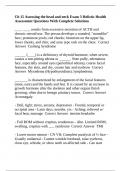Ch 15 Assessing the head and neck Exam 3 Holistic Health
Assessment Questions With Complete Solutions
____ ____ results from excessive secretion of ACTH and
chronic steroid use. The person develops a rounded, "moonlike"
face; prominent jowls; red cheeks; hirsutism on the upper lip,
lower cheeks, and chin; and acne type rash on the chest. Correct
Answer Cushing Syndrome
______ (____) is a deficiency of thyroid hormone, when severe,
causes a non-pitting edema or ______. Note puffy, edematous
face, especially around eyes (periorbital edema), coarse facial
features, dry skin, and dry, coarse hair and eyebrow Correct
Answer Myxedema (Hypothyroidism); lymphedema
_______ is characterized by enlargement of the facial features
(nose, ears) and the hands and feet. It is caused by an increase in
growth hormone after the skeleton and other organs finish
growing; often due to benign pituitary tumor. Correct Answer
Acromegaly
- Dull, tight; stress, anxiety, depression - Frontal, temporal or
occipital area - Lasts days, months, yrs - Aching; relieved w/
local heat, massage Correct Answer tension headache
- Full ROM without crepitus, tenderness - Abn. Limited ROM,
swelling, crepitus with ___ syndrome Correct Answer TMJ
- Lower motor neuron - CN VII; Complete paralysis of ½ face -
Usually unilateral - Cannot wrinkle forehead, raise eyebrow,
close eye, whistle, or show teeth on affected side - Can start
, suddenly and peaks w/in 48 hrs. - Occurs often in pregnant
women Correct Answer bells palsy
- Nausea/vomiting and sensitivity to noise or light - Visual
disturbances, vertigo, tinnitus, numbness/tingling - Located
around eyes, temples, cheeks, forehead - Last up to 3 days -
Precipitated by emotions, anxiety, ingestion of alcohol,
chocolate, cheese - Throbbing, severe; rest may bring relief
Correct Answer Migraines
- Should be elastic & nontender - Abn. Tortuous, hard & tender
with temporal arteritis Correct Answer temporal artery
- Upper motor neuron - Neurological deficit - Paralysis of lower
facial muscles; upper half not affected Correct Answer Brain
Attack (CVA)
• _______: (position or boundary). Normally discrete
- In chronic infection lymph nodes become confluent (merge)
- In acute infection they remain discrete • Consistency:
Normally soft - Hard, firm, unilateral nodes are seen in
metastatic cancers • Mobility: - Typically they are mobile from
side to side and up and down; - Abn. in metastatic disease they
enlarge and become fixed in place • Tenderness - Normal nodes
are nontender - Tender, enlarged nodes suggest acute infection
Correct Answer Delimitation
• Abnormal: - Asymmetry with parotid enlargement, abscess or
tumor - Drooping, weakness or paralysis with CVA or Bell's
Palsy - Mask-like face with ______disease - Sunken face with




